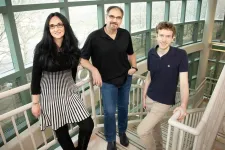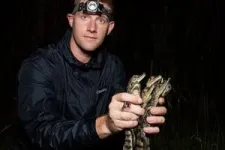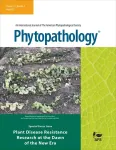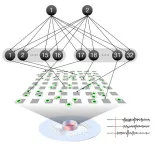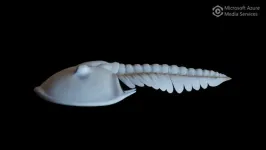(Press-News.org) CHAMPAIGN, Ill. — New research shows that a person’s own behavior is the primary driver of how they treat others during brief, zero-sum-game competitions. Generous people tend to reward generous behavior and selfish individuals often punish generosity and reward selfishness – even when it costs them personally. The study found that an individual’s own generous or selfish deeds carry more weight than the attitudes and behaviors of others.
The findings are reported in the journal Cognitive Science.
Previous research into this arena of human behavior suggested that social norms are the primary factor guiding a person’s decision-making in competitive scenarios, said Paul Bogdan, a Ph.D. candidate at the University of Illinois Urbana-Champaign who led the research in the Beckman Institute for Advanced Science and Technology with U. of I. psychology professors Florin Dolcos and Sanda Dolcos.
“The prevailing view before this study was that individuals form expectations based on what they view as typical. If everyone around me is selfish, then I’m going to learn to accept selfishness and behave accordingly,” Bogdan said. “But we show that your judgments of other people’s behavior really depend on how you behave yourself.”
To test the factors that guide expectations and drive behavior, the researchers conducted a series of experiments involving the Ultimatum Game, which captures how an individual responds to offers from another player proposing to split a pot of money with them. The game requires the proposer to suggest how much each person receives of a $10 pot. The receiver must decide whether to agree to that split or reject it. If the offer is rejected, neither participant receives any money. Rejection can be seen as a form of punishment, even though it costs both players, the researchers said.
Some people tend to be generous – or at least fair – when offering another person a portion of a $10 reward. Others try to take as much of the money as they can, offering lopsided splits that benefit themselves at the expense of their competitors.
When on the receiving end of an offer, generous people tend to accept only generous offers, while selfish people are happy with selfish offers – even when the other player’s selfishness hurts them financially, the researchers found. Having the players switch between receiving and proposing offers allowed the team to explore the relationship between a player’s selfish or generous behavior and their evaluation of other players’ offers.
Further experiments showed that generous and selfish individuals tend to trust others who behave as they themselves do, regardless of the economic outcome.
“Participants will gain more money with a generous person. But a selfish person will prefer to play with someone who behaves as they do,” Bogdan said. “People really like others who are similar to themselves – to a shocking degree.”
The team also evaluated data from a previous cross-cultural study that found that individuals sometimes punish others for their selfishness or for their generosity in a collaborative game involving resource sharing. They found that, when deciding whether and how much to punish others, participants were guided primarily by their own behavior and less by the pressure to conform. People who behaved generously tended to punish selfishness and people who put their own welfare first were much more likely to punish generosity – even in situations where one approach was more common than the other.
Cultural norms toward self-interest or generosity do influence people, as other studies have found, Florin Dolcos said. “But we are not only observers. This study is showing that we filter information about the world through our own view.”
Those individuals whose behavior switched from generous to selfish over time were more likely to punish generosity and reward selfishness – but only after their own behavior changed, the team found.
This helps explain the phenomenon of social alignment, for better and for worse, Florin Dolcos said.
“You may have groups of selfish people who are more accepting of other selfish people, and in order to be part of that group, newcomers might display the same behavior,” he said.
Ultimately, the study finds that a person’s own generous or selfish nature drives their behavior in many arenas of life, Sanda Dolcos said.
“This is not just about decision-making,” she said. “It has practical relevance to many types of social interactions and social evaluations.”
Editor’s note:
To reach Paul Bogdan, email paulcbogdan@gmail.com.
To reach Florin Dolcos, email fdolcos@illinois.edu.
To reach Sanda Dolcos, email sdolcos@illinois.edu.
The paper “Social expectations are primarily rooted in reciprocity: An investigation of fairness, cooperation and trustworthiness” is available online or from the U. of I. News Bureau.
DOI: 10.1111/cogs.13326
END
While wrapping oneself in 100% Egyptian cotton bedsheets is a delightful luxury on a warm summer night, cotton provides much more than breathable, soft fabric. In addition to textiles, the cotton plant is grown for food, fuel, and daily-use consumer products—such as coffee filters, currency, and moisturizers. However, a resurging plant disease called bacterial blight is currently threatening cotton production worldwide.
Bacterial blight is best controlled through natural, genetic resistance. ...
The spectacled caiman, a species native to Central and South America, has been established in Florida since the 1970s. The pet trade and crocodilian farming industries, escapes and deliberate releases made it possible for caimans to invade the Florida Everglades.
They pose a threat to native wildlife occupying the same habitat as our native alligators and crocodiles, competing for food and other resources. Meanwhile, they also prey upon birds, small mammals, fish and other reptiles.
In a new University of Florida study, published in the journal Management of Biological Invasions, wildlife ...
ROCKVILLE, Md.—Ten medical schools have been selected to participate in a two-year quality improvement project to refine, implement and assess a competency-based obesity education curriculum, The Obesity Society (TOS) announced today. Nationally and internationally, numerous medical organizations have highlighted the need for more medical school training on the science and practice of obesity care. This program is a first step to fill that need.
In addition to having access to 12 curated obesity education ...
NYU Tandon School of Engineering researchers will develop new technologies to secure the “digital legal supply chain” — the processes by which official laws and legal information are recorded, stored, updated and distributed electronically — thanks to a $1.2 million grant just awarded by the National Science Foundation (NSF).
Justin Cappos, associate professor in the Computer Science and Engineering department at NYU Tandon, heads up the four-year NSF project, “Defending the Supply Chain of Democracy: Towards a Cryptographically ...
Depression and anxiety are thought to increase a person’s risk of developing cancer, but research results have been inconclusive. In an analysis of multiple studies from the Netherlands, the United Kingdom, Norway, and Canada, investigators found that depression and anxiety are not linked to higher risks for most types of cancer among this population. The analysis is published by Wiley online in CANCER, a peer-reviewed journal of the American Cancer Society.
Experts have suspected that depression and anxiety may increase cancer risk by affecting a person’s health-related behaviors or by having biological effects on the body that support cancer development. ...
An international collaboration between researchers at the RIKEN Center for Brain Science (CBS) in Japan, the University of Tokyo, and University College London has demonstrated that self-organization of neurons as they “learn” follows a mathematical theory called the free energy principle. The principle accurately predicted how real neural networks spontaneously reorganize to distinguish incoming information, as well as how altering neural excitability can disrupt the process. The findings thus have implications for building animal-like artificial intelligences and for understanding cases of impaired learning. The study was published August 7 in Nature Communications.
When we ...
Advisory Highlights:
Risk factors for cardiovascular disease are common among preteens and teens, and the need for preventive care to reduce their risk of cardiovascular disease exceeds the supply of health care resources, according to a new American Heart Association science advisory that reports survey results from pediatric cardiovascular health professionals.
Current data show that 39% of U.S. youth ages 12-19 meet criteria for obesity or overweight, 53% have high cholesterol, 18% with prediabetes and 15% have high blood pressure.
The advisory identifies the need for clinical practice guidelines, collaboration ...
‘We’re not talking about primordial prevention. They’re already at risk for having an early heart attack or stroke’
First comprehensive study in 30 years to examine pediatric preventive cardiology in the U.S., Canada
Heart disease is the leading cause of death in U.S. adults
CHICAGO --- Today in the U.S., a child with risk factors for heart disease (high blood pressure, overweight, etc.) can wait close to a year to see a cardiologist because of high demand and limited resources. This is precious time that could be spent managing ...
Scientists have worked out how one unusual species of trilobite — an ancient, sea-dwelling relative of spiders and lobsters — was able to defend itself against predators and survive a bumpy ride as Earth’s oxygen levels fluctuated.
The seas were filled with trilobites for nearly 300 million years starting in the Cambrian Period, some 520 million years ago. During their time on Earth, which lasted much longer than the dinosaurs, they survived two major episodes of mass extinctions and dominated ocean floor ecosystems.
Their ...
PULLMAN, Wash. – Young men in a recent study who were regular consumers of sports media were more likely to accept rape myths, a set of false and prejudiced beliefs that can serve to excuse or downplay sexual assault.
This connection held even after accounting for participants who believed in certain negative “masculine norms,” namely that men should control women or they should be sexually permissive and try to have sex with as many women as possible.
“Sports media exposure had a unique contribution, and it was significant,” said Stacey Hust, a professor at Washington State University’s Murrow College of Communication and the study’s ...
